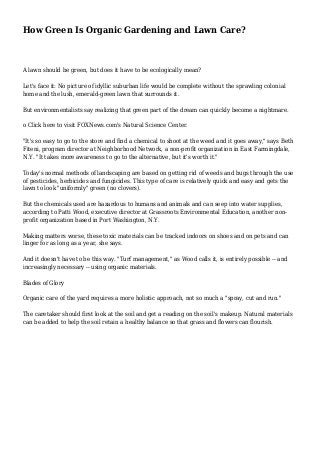
How Green Is Organic Gardening and Lawn Care?
- 1. How Green Is Organic Gardening and Lawn Care? A lawn should be green, but does it have to be ecologically mean? Let's face it: No picture of idyllic suburban life would be complete without the sprawling colonial home and the lush, emerald-green lawn that surrounds it. But environmentalists say realizing that green part of the dream can quickly become a nightmare. o Click here to visit FOXNews.com's Natural Science Center. "It's so easy to go to the store and find a chemical to shoot at the weed and it goes away," says Beth Fiteni, program director at Neighborhood Network, a non-profit organization in East Farmingdale, N.Y. "It takes more awareness to go to the alternative, but it's worth it." Today's normal methods of landscaping are based on getting rid of weeds and bugs through the use of pesticides, herbicides and fungicides. This type of care is relatively quick and easy and gets the lawn to look "uniformly" green (no clovers). But the chemicals used are hazardous to humans and animals and can seep into water supplies, according to Patti Wood, executive director at Grassroots Environmental Education, another non- profit organization based in Port Washington, N.Y. Making matters worse, these toxic materials can be tracked indoors on shoes and on pets and can linger for as long as a year, she says. And it doesn't have to be this way. "Turf management," as Wood calls it, is entirely possible -- and increasingly necessary -- using organic materials. Blades of Glory Organic care of the yard requires a more holistic approach, not so much a "spray, cut and run." The caretaker should first look at the soil and get a reading on the soil's makeup. Natural materials can be added to help the soil retain a healthy balance so that grass and flowers can flourish.
- 2. Organic proponents speak of overseeding and constant watering as one effective method. Nutrient- rich composts and compost teas, available at gardening stores, should be applied to lawns and gardens. Naturalists say a little diluted dishwashing detergent in a spray bottle will zap bugs just as well as toxic pesticides. The whole approach won't leave you with a perfectly uniform lawn, but with one that's healthy, thick and more sustainable over the long term than its artificially maintained counterpart. However, just as a banged-up organic apple costs more at the supermarket than a shiny red wax- coated one, organic lawn-care methods will make you dig deeper into your pockets, and you'll have to overlook imperfections. Nonetheless, environmentalists say it's the right thing to do. A perfectly manicured lawn, free of weeds, is easy to come by through the use of traditional methods, but going green is gaining momentum -- albeit slowly -- in the yard-care sector. You just have to know what you want, and demand that you get it. Lawn care is big business. According to the National Gardening Association, about one in four American households hires a professional to take care of the lawn. Some $44.7 billion was spent on "do-it-for-me" landscape services in 2006, and the "do-it-yourself" sector (such as purchasing chemicals at a gardening shop) also raked in a healthy $34 billion that year, the association says. Most experts agree that once consumers start asking for and demanding healthy alternatives to lawn care, landscapers will follow suit. For instance, Fiteni says Neighborhood Network's list of environmentally friendly landscapers on
- 3. New York's Long Island has grown from five to more than 40 during the past decade. But that's still just a drop in the bucket. Fiteni estimates there are about 1,000 landscaping, gardening and lawn-care operations on Long Island, indicating that there's still a steep uphill climb for organic methods. Four years ago, a poll conducted by the NGA showed about 5 percent of people used an organic approach to lawn care. Due to the current trend in "going green," that number is expected to bump up to around 10 percent when the poll is conducted this year. In the earlier poll, however, when respondents were asked about their interest in organic solutions for landscapes, 52 percent said they might or might not employ them, and 26 percent said they wouldn't be, or probably would not be, interested in organic solutions. "What it gets down to is this whole sense of 'What's the expectation?'," says Bruce Butterfield, research director at the National Gardening Association. "What do people associate with this beauty of this lush lawn, and is the environmental cost of that worth it?" Organic gardening and lawn care take more patience, perseverance and pocketbook power, experts say, but in the end they build up the "immune system" and overall health of the soil. "There's no reason for people to treat their property with non-organic materials," says Peg McDonald of Landscape Artistry in Long Beach, N.Y. "I wouldn't go any other way."